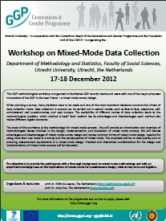 This GGP methodological workshop is organized to familiarize the GGP country teams and users with the lessons learnt in the GGP re-design study (2009-2012). During the period of last four years a decade of GGP experiences have been evaluated and necessary enhancements proposed in order to prepare the GGP as a sustainable research infrastructure of the decades to come. The workshop will introduce one of the major proposed innovations of the GGP in the new future – a mixed mode survey design.
This GGP methodological workshop is organized to familiarize the GGP country teams and users with the lessons learnt in the GGP re-design study (2009-2012). During the period of last four years a decade of GGP experiences have been evaluated and necessary enhancements proposed in order to prepare the GGP as a sustainable research infrastructure of the decades to come. The workshop will introduce one of the major proposed innovations of the GGP in the new future – a mixed mode survey design.
When planning a survey, many decisions have to be made and one of the most important decisions concerns the choice of data collection mode. Data collection in surveys can be carried out in several modes, such as face-to-face, telephone, self-administered mail questionnaires, and web surveys. The availability of different modes of data collection leads to the methodological question: which method is best? Each method has its advantages and disadvantages; each method also makes different logistic demands. Sometimes the choice for a particular data collection is easy and straightforward. But often the situation is more complex and one single method will not suffice. Therefore multiple modes of data collection or mixed modes have become more and more popular in survey practice. Recommendations for the future implementations of the GGP also call for the use of multiple modes of data collection in order to reduce the cost of data collection, while retaining the high level of data quality.
The topic of this workshop is the methodology for mixed-mode surveys. We will provide an introduction and overview of methodological issues involved in the design, implementation, and evaluation of mixed mode surveys. We will discuss advantages and disadvantages of mixed-mode survey design and review common forms of mixed-mode design, reasons for using more than one mode in a survey and the consequences of mixed-mode. The emphasis will be on data quality and on ensuring measurement equivalence in a mixed-mode design. Practical and theoretical considerations for the design and implementation of mixed-mode surveys will be discussed, we will not focus on the ICT aspects of mixed-mode design (software, programming) nor on the statistical models for adjustment, although general principles of adjustment will be reviewed.
The objective is to provide the participants with a thorough background on mixed mode methodology and with an empirical knowledge base on the implications of mixed-mode for questionnaire design, total survey error and logistics. A text on mixed-mode design and a power-point handout will be available for all participants.
The organizers and principal lecturers are prof. dr. Edith de Leeuw and prof. dr. Joop Hox.
Participation is free of charge. Priority will be given to the representatives of the GGP National teams (members of the NNFP). Participants are expected to cover their own travel and accommodation costs.
To apply, please write an e-mail to: ggp@nidi.nl
Download documents:
Fill the form below with your contact information to receive our monthly GGP at a glance newsletter.
